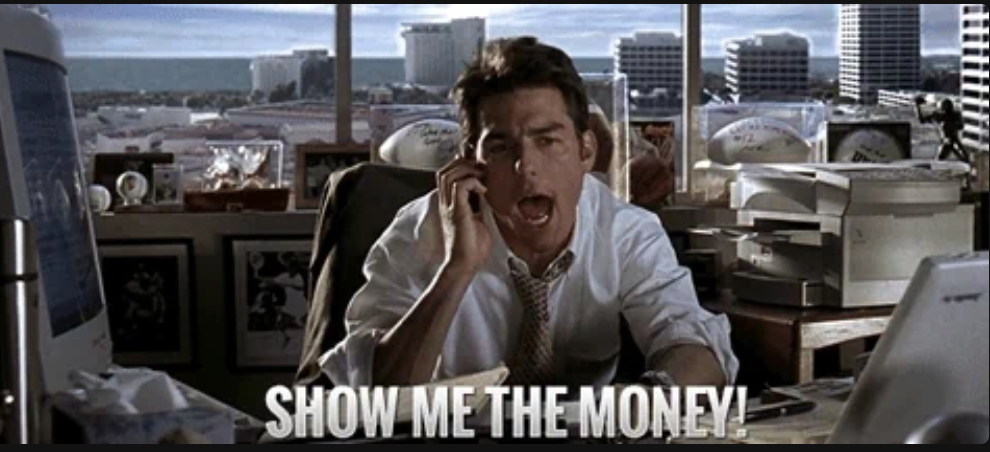Literary agents. Do authors need one?
Whenever I think of an agent, Jerry Maguire springs to mind, shouting down the phone: “Show me the money”!
He was a sports agent, not a literary one, but until I entered this world of publishing, I really had no idea what the role of an agent entailed. Writers Victoria have a great explanation of what literary agents are and exactly what they do. You can read it here.
Source: Jerry Maguire
I’m excited to announce that I have signed with one of the most sought-after literary agencies in Australia: Zeitgeist Agency. They represent so many authors and creatives I admire from Yumi Stynes to Holly Ringland. Not only do they advocate for fabulous local authors, but they also have global reach. A big drawcard for any author!
My agent is Samuel Bernard—a relatively new addition to the agency who is busy building his list. He has shown incredible drive and initiative already (as well as superhuman patience—he approached me in January and I didn’t sign with him until June!). As a freelance writer, critic, and editor himself, he has a broad range of skills that complement my writing and we are working together to polish my third manuscript before we submit to my publisher.
Do Australian authors need an agent?
The simple answer is no. There is nothing stopping authors from pitching stories direct to publishers (adhering to publisher submission guidelines, of course). In some cases, securing an agent is almost as difficult as securing a book deal!
Note, in the UK and USA, it would be highly unlikely you'd secure a book deal without an agent.
So why did I sign with an agent if I already have two books with a publisher?
In the competitive and ever-evolving landscape of the literary world, having an agent can significantly impact an author's career. Making the decision to sign with Zeitgeist was a no-brainer, but I did weigh up the pros and cons (which is why Samuel and I were in discussions for a while!).
I have a great relationship with my publisher and feel confident advocating for myself, although it took time to build this confidence, so there is no issue with me communicating directly with them.
Agents take 15% of any deal they secure, and when earnings for authors are already quite minimal (average earnings for Australian authors are $18,200!) having another cut in income is something to consider. However, often agents can negotiate higher advances and other benefits far beyond what an author can do on their own so that 15% pays for itself.
Warning: if any agent says they charge a reading fee, steer clear. More about fees here.
Ultimately, I decided that despite my current knowledge and industry contacts, my main focus is writing. An agent not only frees up my time to concentrate on my craft but also ensures I'm continually considered for new opportunities. Signing one deal doesn't guarantee a steady stream of contracts, as the publishing landscape is always changing. Having an agent helps navigate these shifts and secures my future in the industry.
Here are some other key benefits authors can enjoy by partnering with a literary agent:
1. Access to Industry Connections
Agents have extensive networks within the publishing industry, including relationships with editors, publishers, and other key decision-makers. For Australian authors, these connections can open doors to both domestic and international markets that might otherwise be inaccessible. An agent's endorsement often carries weight, increasing the chances of a manuscript being seriously considered by top-tier publishers.
2. Expert Negotiation Skills
I can’t even get my teenagers to put their dirty cups in the dishwasher, so clearly negotiation skills are not my strong suit. Navigating publishing contracts can be complex and somewhat intimidating to the layperson. Literary agents bring expertise in contract negotiation, ensuring that authors secure favourable terms, including advances, royalties, and rights. (NB: I strongly recommend obtaining legal advice before you sign a contract with anyone, including an agent.)
3. Market Insight and Strategy
Agents have a deep understanding of current market trends and reader preferences. They can provide strategic guidance on what genres or themes are in demand, not as a strategy to “write for the market” but helping authors tailor their work without compromising artistic integrity.
4. Editorial Support
Many agents offer editorial feedback to polish a manuscript before submission. This support can enhance the quality of the work, increasing its appeal to publishers. Not all agents offer this as part of the arrangement, though, and a lot of that will be down to their availability and client load.
5. Time and Resource Management
Managing submissions, tracking responses, and handling administrative tasks is time-consuming. Pitching for author panels at writers’ festivals and other speaking engagements is also a highly competitive arena. By taking on these responsibilities, agents allow authors to focus on their creative work. This is particularly beneficial for authors who juggle writing with other professional or personal commitments. Again, not all agents commit to each one of these tasks (some don’t have time to approach festivals for panel opportunities etc.).
6. Career Development
Beyond individual book deals, agents are invested in the long-term success of their authors. They provide career advice, helping authors navigate their professional journey, develop their brand, and explore new opportunities, such as film or TV adaptations. This holistic support can be crucial for authors seeking to build sustainable and impactful careers.
It is important to remember this is a business arrangement and a partnership that needs to work for both parties so before committing to anything, you need to feel confident this is a reciprocal professional relationship.
So even though it is not compulsory to have an agent in Australia, for me the benefits can be a game-changer. From opening doors to top publishers and negotiating favourable contracts to providing market insight and editorial support, agents play a vital role in an author's success. By handling the business side of writing, agents allow authors to focus on what they do best: creating compelling stories that resonate with readers around the world.
Here’s to more exciting news to come…
What are your thoughts on agents? Join the conversation on Substack.
Kx


